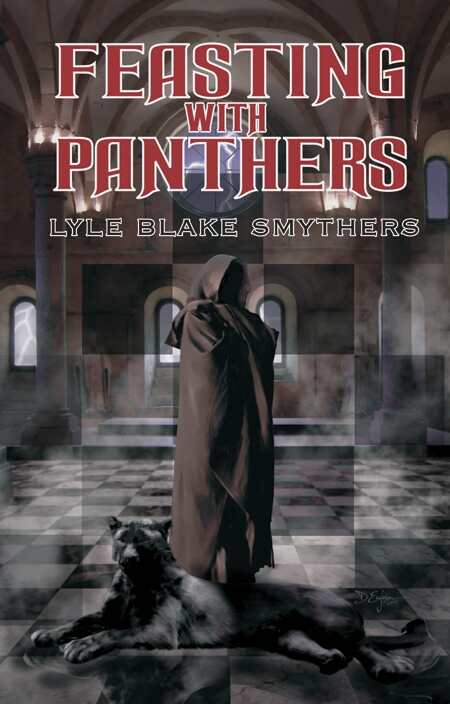Feasting with Panthers
This debut novel from Lyle Blake Smythers is a quest fantasy featuring poet and warrior Catalan and his band of mercenaries. On their way back from an assassination, the group chances upon a barely breathing young man named Talin, to whom they render aid. The wounded stranger is brought to The Floating Head tavern, the mercenaries’ de facto base, where Talin reveals his purpose: he is an agent of Lady Marabo, a sorceress engaged in a magical conflict with Lord Tharados, robber baron and sorcerer—and the Lady’s former lover. Talin’s immediate task is to find the white “army” and return them to Lady Marabo. However, there are two other agents on similar hunts whom Catalan’s crew encounters. The agents and their aides de camp (sentry cats and very chatty human assistants) appear one by one, each telling their stories, piquing Catalan’s curiosity enough to accompany the growing group of travelers.
While the structural characteristics of a genre fantasy novel (a ragtag band of fighters, a quest, magical attacks and rescues, etc.) are present at the basic level, Smythers takes this foundation and piles it high with extra fantasy elements. The resulting skyscraper of bon mots, 1970s rock music, and more is carefully stacked, with each element placed exactly so, and the entire edifice stands tall and strong.
Smythers also weaves literary references throughout the book, not a surprise given that he’s also a published poet. Catalan’s manner of speech and thought reflect a poetic turn of mind, and while his sarcasm is light, he takes his poetry seriously.
Smythers’s method of structuring the plot is very engaging, with each of the young seekers and their attendants anchoring one part of the novel. The history Talin relates of his earlier life is written in a surprising, yet apt, stream-of-consciousness style. Three tales of epic proportions are very similar, yet don’t repeat each other—a difficult feat for even the seasoned novelist—and Smythers delivers all of them in a smooth flow of both grand and simple language. Readers of “classic” literature as well as 1970s music lovers (particularly followers of “progressive” rock from the period) should be well pleased with all the recognition points Smythers uses.
Like a concert pianist playing a favorite piece of music, Smythers conducts the reader through his fantasy world that’s never boring. Future novels from this talented writer should be well worth reading.
Reviewed by
J. G. Stinson
Disclosure: This article is not an endorsement, but a review. The publisher of this book provided free copies of the book to have their book reviewed by a professional reviewer. No fee was paid by the publisher for this review. Foreword Reviews only recommends books that we love. Foreword Magazine, Inc. is disclosing this in accordance with the Federal Trade Commission’s 16 CFR, Part 255.

